人教版九年级英语上册【全册】教案 汇总
新人教版九年级上册初中英语全册优质公开课教案(教学设计)
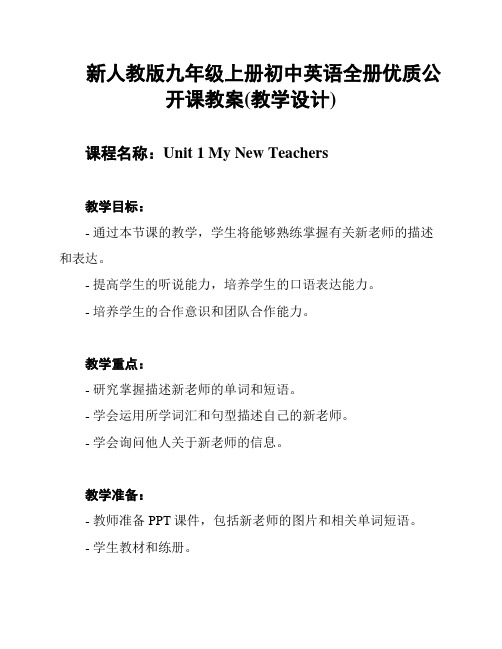
新人教版九年级上册初中英语全册优质公开课教案(教学设计)课程名称:Unit 1 My New Teachers教学目标:- 通过本节课的教学,学生将能够熟练掌握有关新老师的描述和表达。
- 提高学生的听说能力,培养学生的口语表达能力。
- 培养学生的合作意识和团队合作能力。
教学重点:- 研究掌握描述新老师的单词和短语。
- 学会运用所学词汇和句型描述自己的新老师。
- 学会询问他人关于新老师的信息。
教学准备:- 教师准备PPT课件,包括新老师的图片和相关单词短语。
- 学生教材和练册。
教学过程:1. 预导入:- 让学生在教材中找到与新老师相关的对话和信息,引发学生对新老师的讨论。
2. 新课呈现:- 通过PPT呈现新老师的图片,引导学生观察,激发学生对新老师的兴趣。
- 教师朗读并板书相关单词和短语,如:funny, strict, kind, teach, subject, etc.- 帮助学生理解这些词汇的含义和用法。
3. 听力训练:- 播放教材中与新老师有关的录音,要求学生仔细听,并回答问题。
- 教师带领学生讨论录音内容,检查学生对听力材料的理解。
4. 口语表达:- 学生们分组进行合作活动,每组选择一位组员描述自己的新老师,其他组员根据描述的特点猜测是哪位老师。
- 教师在每组间转动,观察学生的口语表达和合作情况,提供必要的指导和帮助。
5. 互动交流:- 分角色进行对话练,有几个学生扮演新老师的角色,其他学生通过提问的方式了解新老师的信息。
- 教师引导学生运用学到的句型和表达方式进行对话,确保每个学生都有参与。
6. 总结反思:- 教师和学生一起总结本节课所学到的词汇、短语和句型。
- 学生们分享本次合作活动的感受和收获。
课后作业:- 完成练册上与新老师相关的练题。
- 列表格,描述自己的新老师,并写出自己对他(她)的评价。
教学延伸:- 学生可以扩展口头表达,介绍其他教师或家人的特点和评价。
- 学生可以编写一段短文,描述自己的梦想老师。
人教版新目标英语九年级上册优质教案(全册)
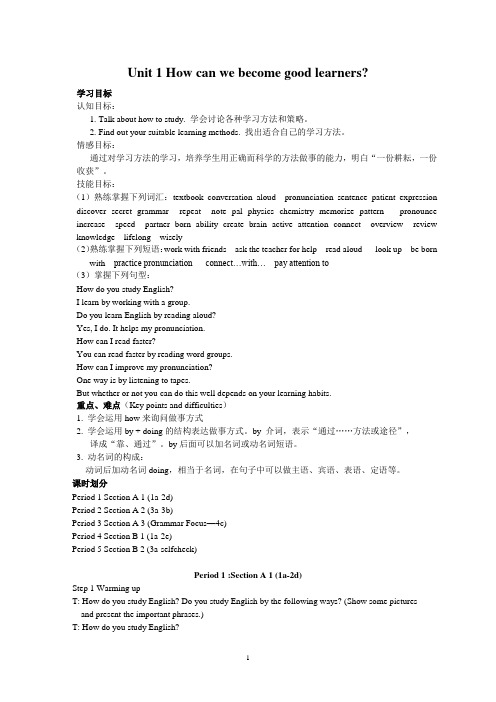
Unit 1 How can we become good learners?学习目标认知目标:1. Talk about how to study. 学会讨论各种学习方法和策略。
2. Find out your suitable learning methods. 找出适合自己的学习方法。
情感目标:通过对学习方法的学习,培养学生用正确而科学的方法做事的能力,明白“一份耕耘,一份收获”。
技能目标:(1)熟练掌握下列词汇:textbook conversation aloud pronunciation sentence patient expression discover secret grammar repeat note pal physics chemistry memorize pattern pronounce increase speed partner born ability create brain active attention connect overview review knowledge lifelong wisely(2)熟练掌握下列短语:work with friends ask the teacher for help read aloud look up be born with practice pronunciation connect…with… pay attention to(3)掌握下列句型:How do you study English?I learn by working with a group.Do you learn English by reading aloud?Yes, I do. It helps my pronunciation.How can I read faster?You can read faster by reading word groups.How can I improve my pronunciation?One way is by listening to tapes.But whether or not you can do this well depends on your learning habits.重点、难点(Key points and difficulties)1. 学会运用how来询问做事方式2. 学会运用by + doing的结构表达做事方式。
人教版九年级上册英语教案(优秀5篇)

人教版九年级上册英语教案(优秀5篇)(经典版)编制人:__________________审核人:__________________审批人:__________________编制单位:__________________编制时间:____年____月____日序言下载提示:该文档是本店铺精心编制而成的,希望大家下载后,能够帮助大家解决实际问题。
文档下载后可定制修改,请根据实际需要进行调整和使用,谢谢!并且,本店铺为大家提供各种类型的经典范文,如合同协议、条据文书、策划方案、总结报告、党团资料、读书笔记、读后感、作文大全、教案资料、其他范文等等,想了解不同范文格式和写法,敬请关注!Download tips: This document is carefully compiled by this editor. I hope that after you download it, it can help you solve practical problems. The document can be customized and modified after downloading, please adjust and use it according to actual needs, thank you!Moreover, our store provides various types of classic sample essays, such as contract agreements, documentary evidence, planning plans, summary reports, party and youth organization materials, reading notes, post reading reflections, essay encyclopedias, lesson plan materials, other sample essays, etc. If you want to learn about different formats and writing methods of sample essays, please stay tuned!人教版九年级上册英语教案(优秀5篇)九年级是整个初中阶段的重要一年,因此教师需要学习先进的教育理念,认真准备每一次教案。
新人教版九年级英语上册全册教案
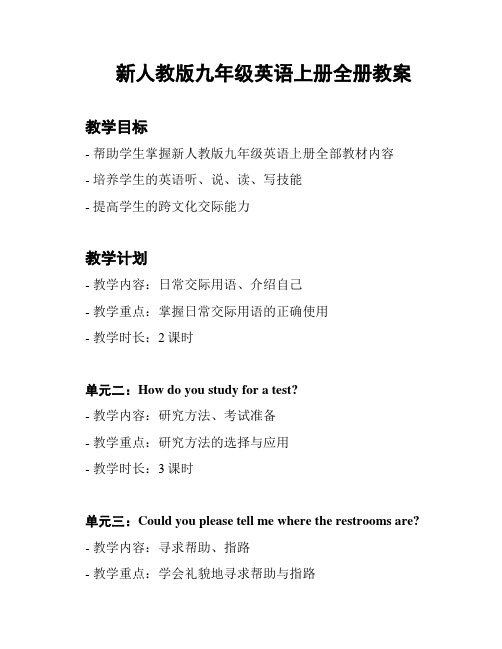
新人教版九年级英语上册全册教案教学目标- 帮助学生掌握新人教版九年级英语上册全部教材内容- 培养学生的英语听、说、读、写技能- 提高学生的跨文化交际能力教学计划- 教学内容:日常交际用语、介绍自己- 教学重点:掌握日常交际用语的正确使用- 教学时长:2课时单元二:How do you study for a test?- 教学内容:研究方法、考试准备- 教学重点:研究方法的选择与应用- 教学时长:3课时单元三:Could you please tell me where the restrooms are? - 教学内容:寻求帮助、指路- 教学重点:学会礼貌地寻求帮助与指路- 教学时长:2课时单元四:I used to be afraid of the dark.- 教学内容:过去的经历和惯- 教学重点:掌握过去式的使用- 教学时长:2课时单元五:What are the benefits of going green?- 教学内容:环境保护、可持续发展- 教学重点:理解环境保护的重要性- 教学时长:3课时单元六:I love music that I can dance to.- 教学内容:音乐、电影与艺术- 教学重点:学会表达自己对音乐、电影和艺术的喜好和感受- 教学时长:2课时单元七:Teenagers should be allowed to choose their own clothes.- 教学内容:青少年的权利与责任- 教学重点:理解和讨论青少年应有的权利与责任- 教学时长:3课时单元八:Reading for pleasure- 教学内容:阅读和写作- 教学重点:培养学生的阅读兴趣和写作能力- 教学时长:4课时单元九:Wildlife protection- 教学内容:野生动物保护- 教学重点:了解野生动物保护的重要性,并表达自己的看法- 教学时长:2课时单元十:Musical instruments- 教学内容:乐器与音乐- 教学重点:了解各种乐器和音乐类型,并能进行简单的介绍- 教学时长:3课时教学评价- 结合课堂表现、作业成绩、测试等多种评价方式进行评价- 通过个人表现、小组合作等方式培养学生的主动研究能力- 鼓励学生参与课堂互动,提高口语表达能力参考资料- 教材:新人教版九年级英语上册- 辅助教材:听力材料、课外阅读材料等。
人教版九年级英语上册教案(全册)
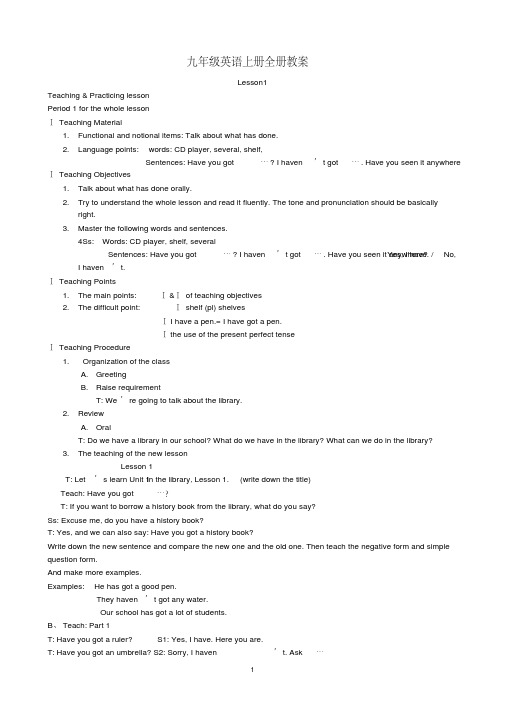
九年级英语上册全册教案Lesson1Teaching & Practicing lessonPeriod 1 for the whole lessonⅠ Teaching Material1.Functional and notional items: Talk about what has done.nguage points: words: CD player, several, shelf,Sentences: Have you got …? I haven’t got …. Have you seen it anywhere Ⅰ Teaching Objectives1.Talk about what has done orally.2.Try to understand the whole lesson and read it fluently. The tone and pronunciation should be basicallyright.3.Master the following words and sentences.4Ss: Words: CD player, shelf, severalYes, I have. / No, Sentences: Have you got …? I haven’t got …. Have you seen it anywhere?I haven’t.Ⅰ Teaching Points1.The main points: Ⅰ&Ⅰ of teaching objectives2.The difficult point:Ⅰ shelf (pl) shelvesⅠI have a pen.= I have got a pen.Ⅰthe use of the present perfect tenseⅠ Teaching Procedureanization of the classA.GreetingB.Raise requirementT: We’re going to talk about the library.2.ReviewA.OralT: Do we have a library in our school? What do we have in the library? What can we do in the library?3.The teaching of the new lessonLesson 1T: Let’s learn Unit 1 In the library, Lesson 1. (write down the title)Teach: Have you got …?T: If you want to borrow a history book from the library, what do you say?Ss: Excuse me, do you have a history book?T: Yes, and we can also say: Have you got a history book?Write down the new sentence and compare the new one and the old one. Then teach the negative form and simple question form.And make more examples.Examples: He has got a good pen.They haven’t got any water.Our school has got a lot of students.B、Teach: Part 1T: Have you got a ruler? S1: Yes, I have. Here you are.T: Have you got an umbrella? S2: Sorry, I haven’t. Ask …Ask the Ss to use Part 1 to make new dialogue in pairs and then ask some to do it in front of the class. Teach player” at the same time.B.Teach: severalT: Have you got a pen? How many pens have you got?S1: FiveT: We may also say: “You’ve got several pens.”Write down the word: severalB.Teach: shelfT: Just now we talked about the library, we know there are many books in the library. Where are the books put? Teach: on the shelf shelf (pl) shelvesB.Part2T: Now I’d like you to make a dialogue talking about borrowing books about different subjects.Do it in pairs first then ask some to do it.Analysis: books about … at the moment = now = right nowB.Part 3Dialogue 1Listen and answer: Well, when you borrow books from the library, you must be careful, but Jim is not careful. What happened? Where was the book?Then read it and learn the dialogue.Analysis: Have you seen it anywhere? ( tense and the use of anywhere)Dialogue 2Listen and answer: How about Tom? What has he lost? Where was it?Read and learn.Analysis: have lost (tense)Perhaps he’s seen it. ( ‘s is short for has)I saw it on Lin Tao’s desk five minutes ago. ( tense)B. Conclusion1. have got = have 2 several = a few 3.on the shelf 4. the present perfect tenseA.Wb. Ex1 &24.Homework1.Do Wb. Ex 3&42.Recite Part 3Lesson 2Reading lesson2 periods for Lesson 2ⅠTeaching Materialsnguage points:Words: already, yard, schoolyard, step, librarian, probably, pay, sadly, mark, bookmarkPhrases: used to, put down, pay for, come up withSentences: Her hobby is reading.So was the librarian.Now her lost books are usually returned to the library.ⅠTeaching Objectives1.Read the whole lesson and try to understand its content. Make sure to answer the questions in Wbcorrectly.2.Read the lesson fluently, the pronunciation and tone should be right.Ⅰ Teaching Points1.The main points---(1)&(2) in teaching objectives2.The difficult pointsA: already, “al” makes an / / soundB: the difference between “on” and “about”C: make sb. + adj.D: used to do sth.E: come up with an idea= think of an ideaPeriod 1Ⅰ Teaching Procedureanization of the classT: Today we are going to Lesson 2, in Lesson 2, we are going to talk about the library.2.ReviewT: Before we learn the new lesson, let’s go over what we learned yesterday.A.OrallyHave = have got eg. They don’t have any shelves.= They haven’t got any shelves.Has = has got eg. Does he have a CD player?= Has he got a CD player?Several=a fewOn the shelfThe construction and concept of the present perfect tenseB.Recite Part 2C.Wb. Ex33.The teaching of the new lessonA.Lesson 2T: We know we can borrow books from a library. But if we lose the books, what should we do? Letgo on to learn Lesson 2, we will know the answer in it.( write down Lesson 2)B.pay forWell, you should pay for it.Teach: pay, paid, paidPay for : give money to sb. for sth.C.onT: Why do people like to go to the library?T: Because there are books on many different subjects.D.knowledgePeople can learn much knowledge from them.E.Part 1 Pre-readF.Part 2Ask the Ss the read the passage and answer questions in their Wb. Ex 1G.Read and learnParagraph 1T: How old is the writer’s grandma?What was she?What is her hobby?Why does she love books?4.Homework.A. Read the end of the text and finish the exercises in Wb.Junior English for ChinaBook 3Lesson 3课型:讲练课ⅠTeaching Materials1.Functional and notional itemsAsk questions about something has donenguage MaterialsWords: encourage, once, abroad, copyPhrases: think of, encourage sb. to do sth., get sth. back, pick upSentences: Have you ever been abroad? Yes, just once.I’ve just cleaned the kitchen.Really? I did that hours ago.Grammar: The difference between the present perfect tense and the past indefinite tenseⅠTeaching Objectives1.Learn to ask questions about something has done2.Read the whole lesson fluently, and pronunciation and intonation should be right.3.Master the following materials(4 skills) Words: once, copyPhrases: think of, pick upSentences: Have you been abroad? Yes, only once.(3 skills) Words: encourage, abroadPhrases: get sth. back, be abroadⅠ Teaching Points1.The main points: (1)&(2) in teaching objectives2.The difficult points:A.“ever, just, already”, they should be put in the middle of “ have done”B. The difference between the present perfect tense and the past indefinite tenseⅠ Teaching Procedureanization of the class2.RevisionBefore we go on to learn the new lesson, let’s go over what we learn in Lesson 2.A.OralGrandma lost library books. If she really lose them, what should she do?Did the librarian have any ideas? What is it?What did they doB. Workbook Ex23.The teaching of the new lessonA.Lesson 3Can Grandma get all her lost books back? Let’s go on to learn Lesson 3.B.Read Part 1 and answer the following questions:Did Grandma get all her lost books back?How did she get them back?C.Read and learn*Think of:认为、想起、想出Eg: What do you think of it?I often think of my friends in Beijing.*Encourage sb. to do sth.Eg. The teacher thought a lot about how to encourage his students to study hard.*Pick up: pick it\them up*return sth. to sb.*get sth. from sb.D.Reading practiceE.Retell the storyF.Ask and answerHave you ever picked up a library book? Yes, I have\ No, I haven’t.Ask the students to ask and answer in pairs by using Part 2 and ask some to do it in class.Teach: abroad, onceDo Wb. Ex1G.Part 3Play and English songT: Have you ever listened to foreign music?Ss: Yes, we have.T: And we have just listened to it.Make sentences by using “ I have just…”Read and learnTeach: copyPoint out the difference between the present perfect tense and the past indefinite tense.The present perfect tense shouldn’t be used together with the past time.H.Conclusionthe use of “ever, just, already” in the present perfect tensethe difference between the present perfect tense and the past indefinite tense4.HomeworkA.Wb. EX2&3B.Go over the language pointsLesson 4课型:练习课ⅠTeaching Materialsnguage MaterialsWords: spoil, as, screenPhrases: on the computer, find outSentences: I guess somebody else has borrowed it.Could you find out who has taken it?Grammar: The present perfect tenseⅠTeaching Objectives4.Read the whole lesson fluently, and pronunciation and intonation should be right.5.Learn to read the information on the library cards and the computer screen.6.Master the following materials(4 skills) Word: asphrase: on the computer, find out(3 skills) Words: spoil, screenⅠ Teaching Points3.The main points: (1)&(2) in teaching objectives4.The difficult points: learn to read the information on the library cards and the computer screenⅠ Teaching Procedureanization of the classToday, we are going to learn Lesson 4. In Lesson 4, we’re going to talk about the information on thelibrary cards and the computer screen.6.RevisionBefore we go on to learn the new lesson, let’s go over what we learn in Lesson 3.A.OralHow could Grandma get all her lost books back?the use of the adverbs in the present perfect tense.7.The teaching of the new lessonA.Lesson 4Yesterday, we learned that grandma usually borrowed books from the library. There is a new librarytoday. If you want to read books, how can you find them? Let’s go on to learn Lesson 4.B.Part1I’d like you to listen and do Wb. Ex.1C.Part 2Ask the students to write down something about the school librarian and report it to the class. Teach:as He works there as a shop assistant.D.Part 4Learn to read the information on the cards and the computer screen.E.Part 3Listen and answer: What does the boy want to borrow?What’s its name?Who has borrowed it?Read and learn.has borrowed, has taken, has got( the present perfect tense)find outRead and act.F.Part 5Read and learn.G.Checkpoint 1H.Wb. Ex.2&58.HomeworkA.Wb. Ex 3B.Go over the whole unit.Lesson 5课型:讲练课ⅠTeaching Materials4.Functional and notional itemsA. Learn to ask how long sb. has done sth.B. Learn to talk about if someone has been to a place.nguage MaterialsWords: surf, surfing, surfer, wave, Hawaii, beach, twice, Bondi, none, Newquay, water-ski, canoe Phrases: have a try, since last Wednesday, learn sth. from sb. how to do it, several timesSentences: What’s …like?How long have you been in Sydney?Have you ever been to …?Grammar: the present perfect tenseⅠTeaching Objectives7.Learn to ask questions about something has done8.Read the whole lesson fluently, and pronunciation and intonation should be right.9.Master the following materials(4 skills) Words: surf, surfing, surfer, wave, beach, twice, nonePhrases: have a trySentences: Have you been to…? Several times.(3 skills) Words: water-ski, canoe(1 skill) Words: Hawaii, Bondi, NewquayⅠ Teaching Points5.The main points: (1)&(2) in teaching objectives6.The difficult points:A.“ever, just, already”, they should be put in the middle of “ have done”B. The difference between the present perfect tense and the past indefinite tenseⅠ Teaching Procedureanization of the classToday, we’re going to talk about water sports.2. RevisionRevise the names of the sports they have learnt: roller-skating, skating, jump, race, skiing.10.The teaching of the new lessonA.Lesson 5And swimming is a kind of water sport because you have to swim in the water.Well, what other water sports do you know? Let’s go on to learn Unit 2 Water sports.e colour page1 to teach: surf, surfing, surfer, wave, water-skiing, canoe.C.Part 1Listen and answer: Who can surf, Ted or Bruce?How long has Bruce been in Sydney?Why did he come to Sydney?Who teach Bruce to surf?Read and learn:What’s …like? = How is …?Since last WednesdayLearn sth. from sb.Have you ever been to …?Have a tryHow to do itD.Read and act.E.Part 2Have you ever surfed?Have you ever been to Hawaii?Ask and answer in pairsLearn: Bondi, Cape Town, Newquay, noneNo one 人单数No one is herenone 人/物单数/复数None of them is here.F.Wb. Ex3. 2 . 1 .G.ConclusionSurf, surfing, surfer, waveHe’s a surfer. Have a tryHow long have you been in …?Have you ever been to …?11.Homeworkwb. Ex 2P.S.The writing on the blackboardUnit 2 Water sportsLesson 5surf ⅠWhat’s …like? = How is …? Have a trylearn sth. from sb.surfing ⅠHow long have you been in …?surfer Since last Wednesday no one 人/ 单wave ⅠHave you ever been to …? none人/物单/复Hawaii ⅠNone of us has. none of us (true)Cape Town No one has. no one of us (false)Lesson 6ⅠTeaching MaterialsWords: describe, especially, attract, so-called, possible, since, part-time, although, fit, prize, competition, event, Olympic, Waikiki, Honolulu, San FranciscoPhrases: all over, large numbers of, no matter, both…and…, give up, ever since, the Olympic Games Sentences: Now it is enjoyed by people all over the world.You can always find surfers out riding the waves.In the morning, he works as a part-time assistant in a surf shop.ⅠTeaching Objectives1.Try to understand the whole passage and read the whole lesson fluently and the pronunciation andintonation should be right.2.Master the following materials:4Ss Words: describe, especially, attract, so-called, possible, since, part-time, although, fit, prize,competition, event, OlympicPhrases: all over, large numbers of, no matter, both…and…, give up, ever since, the Olympic Game Sentences: Now it is enjoyed by people all over the world.You can always find surfers out riding the waves.In the morning, he works as a part-time assistant in a surf shop.3.Master the following materials:3Ss Words: Waikiki, Honolulu, San FranciscoⅠ Teaching Points1.The main points: (1) &(2) in teaching objectives2.The difficult points: A. the use of “although” B. the use of “no matter”C. the use of “ both…and…”Ⅰ Teaching ProcedurePeriod 1anization of the classTalk about surfing2.ReviewHave you ever been to Qingdao?Who has ever been to Bondi Beach? None of us.Has anybody water-skied before? Nobody has.3.The teaching of the new lessonA.Lesson 6In Lesson 5, we learned some water sports. Today, we are going to talk about one of them----surfing.B.Talk about surfingWhere is the best place for surfing? Why?Have you ever watched people surf?What do you think of it?Ask the students to say something about it.Teach: fit, prize, competitionSurfing will make you fit( healthy). Maybe you can take part in a surfing competition, then you maywin a prize.Part 1 Pre-read Ask and answer then teach: watch sb. do sth.; describe sth.C.Part 2Read and do wb. Ex.1D.Conclusion.fit, win a prize4.HomeworkA.Go over what we learn todayB.Read the passage and find out all the new words, try to guess their meaning.Period 2Teaching Procedureanization of the classLearn the passage2.ReviewWatch sb. do sth.; fit(healthy); win a prize3.The teaching of the new lessonA. Paragraph 1Find out the key sentence. Then learn the new language points.one of…; be enjoyed by sb.; all over the world= everywhere in the world;be famous for\ as; especially; attract sb. to somewhere; large numbers of people(it is used to modify countable nouns)= a number ofRead this paragraph after the tape and then read it together. Ask some to read it in classB. Paragraph 2Find out the key sentence. Then learn the new language points..Read this paragraph after the tape and then read it together. Ask some to read it in classC.Paragraph 3Find out the key sentence. Then learn the new language points.D.Paragraph 4Find out the key sentence. Then learn the new language points.E.Conclusion4. HomeworkA.Wb. Ex. 2&3B.Retell the storyLesson 7课型:讲练课ⅠTeaching Materials1.Functional and notional itemsLearn to talk about something has donenguage materialsWords: such, fail, practice, New Zealand, businessPhrases: such great fun, on business, so farSentences: Time flies!He’s gone to New Zealand on business.ⅠTeaching Objectives1.Learn to talk about something has done.2.Try to understand the content and read the dialogue fluently, the pronunciation and intonation should beright.3.Master the following materials:4 skills Words: such, fail, practice, businessPhrases: so far, on businessSentences: He’s gone to …4.Master the following materials:2 skills Words: New ZealandⅠTeaching Points1.The main points: (1) & (2) in teaching objectives2.The difficult pointsA.such great funsuch+adj. +n.(不可数/复数)such a + adj. + n.(可数名词单数)与so的区别B.have been surfingC.practice sth.\ doing sth.D.gone to & been togone to去了,强调不在说话地点been to 去过,强调对某地有所了解,可以在说话地点ⅠTeaching Procedureanization of the classWe are going to talk about Bruce and Ted again. In grammar, we are going to talk about the present perfect tense.2.RevisionA.Retell the story in Lesson 6.B.Wb. Ex2&33.The teaching of the new lessonA.Lesson 7In lesson 5, we know Bruce will show Ted how to surf. Can Ted surf now?B.Listen and answerCan Ted surf? What has Bruce been doing every day? Why?When is Ted leaving for home?How about Bruce?Where is Bruce’s uncle?C.Read and learnTeach: *on Bondi Beach*such great fun: very funnysuch+adj. +n.(不可数/复数) such beautiful flowerssuch a + adj. + n.(可数名词单数) such a beautiful flowerso+ adj. So beautiful a flower前,要用“so”如果在数量词“many, much, few, little”eg: so much water, so many people* fail (in) the examfail to do sth.=can’t do sth.eg: fail the exam=not pass the examfail to catch the bus= miss the bus* need more practicepractice: 练习,实践(为不可数名词)如:Practice makes perfect.Practice : 练习(为及物动词)如:practice doing sth.* Time flies.* gone to去了,强调不在说话地点been to 去过,强调对某地有所了解,可以在说话地点eg: Where is he? He’s gone to his home.* on businessD.Reading Practice.E.Part 2 Ask and answeryet 用于否定句,一般疑问句及条件状语从句already用于肯定句,如果用于一般疑问句则表示惊讶的语气F.Answer the questions in groups. Teach: so far: up to nowAsk some to do it in classG.ConclusionH.Wb. Ex 14.HomeworkA.Recite Part 1B.Go over the whole lessonLesson 8课型:练习课ⅠTeaching MaterialsWords: cross, channel, mainland, slow, journey, among, proud, pride, unless, shot, truthPhrases: come true, slow down, be proud of, speak highly of, not only…but also…Sentences: Among them were his parents.He is not only the pride of our school, but also the pride of all the people in Hainan.ⅠTeaching Objectives1.Read the passage in Part 3 and try to understand its meaning. Read it fluently and the pronunciation andintonation should be right.2.Finish all the exercises in this lesson.3.Master the following materials as four skills:Words: cross, channel, mainland, slow, journey, among, proud, pride,Phrases: come true, slow down, be proud of, speak highly of, not only…but also…Sentences: Among them were his parents.He is not only the pride of our school, but also the pride of all thepeople in Hainan.4. Master the following materials as three skills: words: unless, shot, truthⅠTeaching Points1.The main points: (1) & (2) in teaching objectives如果连接两个主语时,用就近一致原则。
人教版九年级上册英语教案5篇
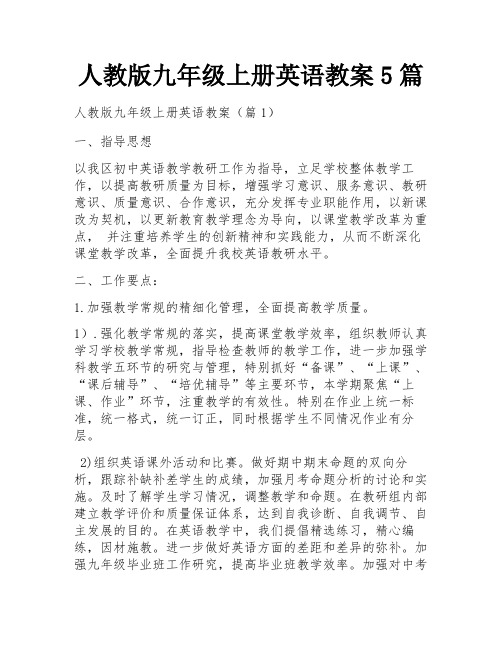
人教版九年级上册英语教案5篇人教版九年级上册英语教案(篇1)一、指导思想以我区初中英语教学教研工作为指导,立足学校整体教学工作,以提高教研质量为目标,增强学习意识、服务意识、教研意识、质量意识、合作意识,充分发挥专业职能作用,以新课改为契机,以更新教育教学理念为导向,以课堂教学改革为重点,并注重培养学生的创新精神和实践能力,从而不断深化课堂教学改革,全面提升我校英语教研水平。
二、工作要点:1.加强教学常规的精细化管理,全面提高教学质量。
1).强化教学常规的落实,提高课堂教学效率,组织教师认真学习学校教学常规,指导检查教师的教学工作,进一步加强学科教学五环节的研究与管理,特别抓好“备课”、“上课”、“课后辅导”、“培优辅导”等主要环节,本学期聚焦“上课、作业”环节,注重教学的有效性。
特别在作业上统一标准,统一格式,统一订正,同时根据学生不同情况作业有分层。
2)组织英语课外活动和比赛。
做好期中期末命题的双向分析,跟踪补缺补差学生的成绩,加强月考命题分析的讨论和实施。
及时了解学生学习情况,调整教学和命题。
在教研组内部建立教学评价和质量保证体系,达到自我诊断、自我调节、自主发展的目的。
在英语教学中,我们提倡精选练习,精心编练,因材施教。
进一步做好英语方面的差距和差异的弥补。
加强九年级毕业班工作研究,提高毕业班教学效率。
加强对中考走势的信息收集和测试研究,集中精力,争取在九年级中考中取得一个满意的成绩。
2.?以教科研引领,为教师的专业化成长打造新的平台。
1).大力开展校本教研,拓宽教师课程视野,逐渐成为学习型、反思型教师。
通过同伴互动。
充分发挥学校骨干教师、优秀教师的作用,通过“共享式的集体备课”、“探究式的课堂实践活动”和“专题式的学习讨论活动”等促进教师之间的互动,营造“集体备课、资源共享、个人加减、教后反思”的教研氛围。
结合优质课堂活动,并且推出一节具有代表性的研讨课。
(陈美红老师开课)2).根据各年级特点,进行一次主题教研活动。
人教版九年级英语全册教案4篇
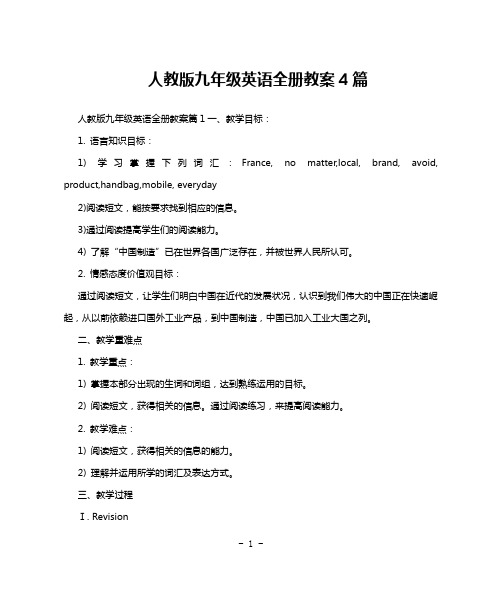
人教版九年级英语全册教案4篇人教版九年级英语全册教案篇1一、教学目标:1. 语言知识目标:1) 学习掌握下列词汇:France, no matter,local, brand, avoid, product,handbag,mobile, everyday2)阅读短文,能按要求找到相应的信息。
3)通过阅读提高学生们的阅读能力。
4) 了解“中国制造”已在世界各国广泛存在,并被世界人民所认可。
2. 情感态度价值观目标:通过阅读短文,让学生们明白中国在近代的发展状况,认识到我们伟大的中国正在快速崛起,从以前依赖进口国外工业产品,到中国制造,中国已加入工业大国之列。
二、教学重难点1. 教学重点:1) 掌握本部分出现的生词和词组,达到熟练运用的目标。
2) 阅读短文,获得相关的信息。
通过阅读练习,来提高阅读能力。
2. 教学难点:1) 阅读短文,获得相关的信息的能力。
2) 理解并运用所学的词汇及表达方式。
三、教学过程Ⅰ. Revision1. Ask Sstorole-play the conversation in 2d.2. Checkthehomework. Let some Ss tell read their sentences.(1). This ringismade of silver.(2). This kindofpaper is made from wood.(3). What ispaintmade from?(4). Hang Zhouisfamous for tea.(5). As far asIknow, tea plants are grown on the sides of the mountains.Ⅱ. Lead in1. 展示一段伦敦奥运会礼品的视频,让学生了解中国制造已被世界人民所接受。
Then ask Sssomequestions:T: As we know,thereare so many things made in China in England. What about in America andothercountries in the world? Now let’s read the passage of 3a.First, readquickly and find the answer to this question:1) Where did KangJianvisit last year?2) Were theremanythings made in China in the US?3) What twothingsdid Kang Jian want to buy in the US?4) Where weretheymade?Ss read thearticlequickly and try to answer the questions:2. 方法指导:带着问题,然后快速阅读短文,争取在较短的时间内,找到答案。
人教版九年级上册英语教案(优秀8篇)

人教版九年级上册英语教案(优秀8篇)作为一位兢兢业业的人民教师,总归要知道如何编写一份优秀的教案。
这次为您整理了8篇《人教版九年级上册英语教案》,亲的肯定与分享是对我们最大的鼓励。
九年级上册英语教案篇一一、教学内容本课是第二单元的最后一课,阅读课,是本单元话题过去的某种状态的延伸和继续。
文章讲得主要内容是一个老是惹麻烦的男孩在明白了母亲对他的爱之后变成一个好孩子的故事。
二、教学目标⑴掌握一些主要的词汇和句型used to be like 等。
⑴引导学生理解课文内容,掌握阅读技巧,如扫读、细读、概括文章大意,利用上下文信息猜词等。
⑴通过阅读课文,并设计各种活动训练学生运用英语进行听说读写各种活动的能力。
⑴激发学生感恩父母,热爱父母,关注身边的人的情感。
三、教学重点和难点⑴训练学生利用上下文信息填写词汇和句子的能力。
⑴培养学生的阅读策略和写作能力。
⑴利用本课所学知识表达个人意见,对课文进行深层理解。
四、设计理念依据纽南(David Nunan)所提出的任务型及合作式教学原则,使学生在小组学习中获取信息,处理信息和运用信息,激发学生用所学语言进行交际的愿望和自信心,促进合作精神和文化意识的发展。
五、教学设计1. 总体思路:本节课是在多媒体的课堂教学环境下实施的大容量、快节奏的课堂教学。
笔者先让学生简短描述父母以前和现在的职业,外貌,性格,爱好再欣赏英文歌曲thank you, dad. 导入,酝酿了一种感激父母的氛围,接着引导他们畅诉父母对自己的帮助的故事,然后让学生阅读短文,感受母亲爱的伟大。
在阅读过程中,通过让学生看标题,预测课文内容、概括文章段落大意、根据上下文填所缺的句子,判断正误等各种方式提高阅读技能。
最后,笔者提供关键词让学生复述课文,使其能熟练得掌握所学的重点词汇、短语和句子。
阅读后,笔者抛出这样的问题让学生讨论:我们该用什么方式报答父母?培养学生反哺意识。
最后通过写作,提高学生综合运用语言的能力。
- 1、下载文档前请自行甄别文档内容的完整性,平台不提供额外的编辑、内容补充、找答案等附加服务。
- 2、"仅部分预览"的文档,不可在线预览部分如存在完整性等问题,可反馈申请退款(可完整预览的文档不适用该条件!)。
- 3、如文档侵犯您的权益,请联系客服反馈,我们会尽快为您处理(人工客服工作时间:9:00-18:30)。
(151页)人教版九年级上册(全册)教案汇总Unit 1How can we become good learners?Section A (1a-2d)1.重点单词:textbook,conversation,aloud,pronunciation,sentence2.重点短语:make word cards,work with friends,ask the teacher for help,listen to tapes,speaking skills,word by word,be patient3.重点句式:How can we become good learners?—How do you study for a test?—I study by working with a group.What about reading aloud to practice pronunciation?It's too hard to understand spoken English.—Have you ever studied with a group?—Yes,I have.I've learned a lot that way.Try to guess a word's meaning by reading the sentences before and after it.You can become better by reading something you enjoy every day.The more you read,the faster you'll be.1.重点短语和句型2.How对方式进行提问及用by+doing回答How对方式进行提问及用by+doing 回答一、预习课本P1-2新单词并背诵,完成下面的汉译英.1.课本____________ 2.交谈____________3.大声地____________ 4.发音(n.)____________5.句子____________ 6.有耐心的____________二、认真预习1a-2d找出下列短语和句型.1.制作单词卡片________________________________________________________________________2.和朋友一起学习________________________________________________________________________ 3.向老师请教________________________________________________________________________ 4.听磁带________________________________________________________________________ 5.口语技能________________________________________________________________________ 6.逐词地________________________________________________________________________ 7.耐心点儿________________________________________________________________________ 8.我们怎样才能成为好的学习者?________________________________________________________________________ 9.——你怎样为考试复习做准备?——我通过和小组合作来学习.________________________________________________________________________ ________________________________________________________________________ 10.大声朗读来练习发音怎么样呢?________________________________________________________________________ 11.理解英语口语太难了.________________________________________________________________________ 12.——你曾经和小组一起学习吗?——是的,用那种方法我学到很多.________________________________________________________________________ ________________________________________________________________________ 13.通过阅读一个单词前后的句子尽量来猜测它的意思.________________________________________________________________________ 14.通过每天阅读一些你喜欢的东西,你能变得更好.________________________________________________________________________ 15.你读得越多,就会读得越快.________________________________________________________________________Step 1情景导入(Show some pictures about ways to learn English)Teacher:Do you like English?How do you learn English?There are some good ways to learn English.Let's learn the ways to learn English like this:How do you study English?I learn English by listening to tapes.环节说明:由图片入手,图文并茂,引起学生的学习兴趣.Step 2完成教材1a-1c的任务1.学生领读1a中的短语,教师纠正错误读音,学生识记短语后再添加其他的学习英语的方法并且熟悉by doing sth.的用法. (3分钟).2.认真听录音,看看这些学生的学习方法,紧挨着名字写下图中的字母. (2分钟)3.再听一遍录音,并跟读对话. (2分钟)4.结对练习1c中的对话,并请一些学生表演出他们的对话. (3分钟)5.模仿1c中的对话,结合1b的答案材料与同伴编练新对话,并邀请几组学生表演对话. (5分钟)参考案例A:How do you study for a test?B:I study by working with a group.6.小结训练. (3分钟)(B)1.________ do you study for a test?A.What B.How C.When D.Where(D)2.He learns English by ________ English songs.A.listen B.listen toC.listening D.listening to(D)3.How do you study ________ an examination?A.to B.at C.with D.for(A)4.Do you often have meals ________ your parents?A.with B.for C.to D.at(B)5.—How do you study for a test?—I study by ________.A.ask the teacher for helpB.asking the teacher for helpC.ask the teacher to helpD.asking the teacher to help环节说明:听说结合,第一时间向学生传达了语言目标,通过结对对话练习和小结训练,使语言目标得以强化.Step 3完成教材2a-2c的任务1.在小组内认真读一读2a中的句子并交流句子的意思,为听力做好准备. (2分钟)2.认真听录音,在你听到的问题前打勾. (2分钟)3.再认真听一遍录音,从2b中把2a中的问题的答案找出来,把序号填写在2a表格Answers 栏目下,集体核对答案. (3分钟)4.让学生利用2a, 2b中的信息仿照2c 的形式练习对话,并要求多组同学表演对话. (5分钟)参考案例A:Have you ever studied with a group?B:Yes.I have.I've learned a lot that way.5.小结训练. (2分钟)1.What about reading(read) aloud to practice pronunciation?2.Listening to tapes improves my listening skills(skill).3.Have you ever studied (study) with a group?4.It's too hard for me to_learn (learn) English.5.We should practice speaking (speak) English aloud every morning.环节说明:通过听、说、读、写训练让学生掌握了询问方式的句型及答语,并且使学生的口语表达能力在这一环节得到提升.Step 4完成教材2d的任务1.学生自读对话,回答下面的问题. (5分钟)1)Why is Jack nervous?2)How should Jack read faster?3)What's Annie's advice about understanding the words?2.大声朗读2d中的对话,读熟后与同伴结对练习,分角色表演对话. (3分钟)3.邀请三组同学来表演对话. (5分钟)4.小结训练. (3分钟)1.不要逐词地读,要读字群.Don't_read_word_by_word.Read_word_groups.2.每天读一些你喜欢的东西你就能变得更好.You_can_become_better_by_reading_something_you_enjoy_every_day.3.你读得越多,读得越快.The_more_you_read,the_faster_you'll_be.环节说明:将对话问题化,既能锻炼学生的思维能力又能加深对课文的理解. 小结训练又对对话中的重要句型进行了巩固加深.Step 5问题探究()1.—How do you study English so well?—________ reading lots of books.A.To B.Of C.At D.By答案选择D,“by+v.ing”短语的含义是“通过……;凭借……”,其中by为介词,后面常接动名词短语,表示通过做某事而得到某种结果;在句中常用作方式状语,表示的方法、手段等比较抽象.()2.Reading aloud can improve my ________ skills so that everyone can understand my ________ English.A.speaking;speaking B.spoken;spokenC.speaking;spoken D.spoken;speaking答案选择C,spoken和speaking 这两个都是形容词,spoken意为“口头的,口语的”,speaking意为“讲话的”,因此答案选择C, speaking skills意为“说话技能”;spoken English 意为“英语口语”.请学生们做前面课时训练部分.Section A(3a-3b)1.重点单词:expression,discover,secret,grammar2.重点短语:an English movie called Toy Story,fall in love with,as well,look up3.重点句式:The teacher spoke so quickly that I did not understand her most of the time.I was afraid to ask questions because of my poor pronunciation.I can find the meaning of new words by looking them up in a dictionary.1.重点短语和句型2.学习英语的方法学习英语的方法一、预习课本P3新单词并背诵,完成下面的汉译英.1.表达____________ 2.发现____________3.秘诀____________ 4.语法____________二、认真预习P3找出下列短语和句型.1.一部叫做Toy Story的电影________________________________________________________________________ 2.喜欢上________________________________________________________________________ 3.也________________________________________________________________________ 4.老师说得如此的快以至于我大多数时间都不明白.________________________________________________________________________ 5.因为我的发音很差,我害怕问问题.________________________________________________________________________ 6.我通过在字典里查询找到新单词的意思.________________________________________________________________________Step 1情景导入Teacher:Wei Fen really likes English and she is a student who is good at English but she didn't use to like English.Do you know what has changed her?Let's read the passage to find the answer.环节说明:由Wei Fen英语成绩的变化为话题,引起学生的好奇,同时又引出要学的内容.Step 2完成教材3a-3b的任务1.阅读3a中的短文,根据短文内容,回答3个问题. (2分钟)2.认真阅读短文,根据文章内容用文章中的单词或词组完成3b中的句子填空. 完成后让学生展示自己的答案,教师点拨. (3分钟)3.再次细心阅读短文,理解每一句话的意思,小组合作解决遇到的疑难问题. (3分钟) 4.教师点拨短文中出现的重点和难点. (2分钟)5.熟读短文,识记并背诵知识要点. (3分钟)6.小结训练. (5分钟)(C)1.He speaks ________ quickly ________ I can't hear clearly.A.too;to B.enough;toC.so;that D.very;that(D)2.He didn't go to school ________ his illness.A.because with B.becauseC.so D.because of(B)3.—Are you afraid of ________ alone?—No,I'm not.A.be B.beingC.stay D.to stay(B)4.You mustn't ________ the bus until it stops.A.get up B.get offC.get down D.get over(C)5.Have you ever been to the village ________ Green Country?A.call B.callingC.called D.to call(C)6.I think ________ is a good way to learn English well.A.listen to tapes B.listening tapesC.listening to tapes D.listen tapes(D)7.He likes English and his brother likes English ________.A.also B.as well asC.either D.as well(C)8.Can you help me ________ the words in a dictionary?A.look like B.look afterC.look up D.look at环节说明:通过阅读分析文章,学生的阅读分析能力在这一环节得到提升,小结训练又及时地巩固强化了重要的知识点.Step 3问题探究()1.She said that memorizing the words of pop songs ________ also helpful.A.were B.is C.was D.are答案选择C,此句为复合句,是由主句和一个宾语从句构成. 宾语从句的主语由动名词短语memorizing the words of pop songs来充当. 动名词做主语,谓语动词用单三形式. 又因为主句是一般过去时态,所以从句也应该用一般过去时态,所以答案选择C.2.as well 的用法他懂法语,他也懂英语. He_knows_French_and_he_knows_English_as_well.as well相当于also或too,表示“还,也”等意思,常用于肯定语或疑问句句尾.请学生们做前面课时训练部分.Section A(Grammar Focus-4c)1.重点单词:repeat,note,pal,physics,chemistry,memorize,pattern2.重点短语:take notes,write in an English diary,using an English dictionary3.重点句式:—Do you learn English by reading aloud?—Yes,I do.It helps my pronunciation.—How can I improve my pronunciation?—One way is by listening to tapes.1.学习英语的方法2.How 对方式提问及用by+doing进行回答1.学习英语的方法2.How 对方式提问及用by+doing进行回答一、预习课本P4新单词并背诵,完成下面的汉译英.1.重复________ 2.笔记________3.朋友________ 4.物理________5.化学________ 6.模式________二、认真预习Grammar Focus-4c找出下列短语和句型.1.做笔记________________________________________________________________________ 2.写英语日记________________________________________________________________________ 3.使用字典________________________________________________________________________ 4.—你通过大声朗读来学习英语吗?—是的,它对我的发音有帮助.________________________________________________________________________ ________________________________________________________________________ 5.—我怎么能提高我的发音?—一个方法就是听录音.________________________________________________________________________ ________________________________________________________________________Step 1情景导入Teacher:How do you study English?Student1:I study English by working with friends.Teacher:How do you study for an English test?Student2: I study for an English test by asking the teacher for help.......环节说明:通过师生互动问答,对前两节课所学的重要的句型和短语进行了复习.Step 2完成教材Grammar Focus的任务1.学生大声朗读Grammar Focus中的句子. (2分钟)How_do_you_learn_English?(你怎么学习英语的?) I learn by_studying_with_a_group.(我通过小组合作来学习).Do_you_learn_English_by_reading_aloud?(你通过大声朗读来学习英语吗?) Yes,I do.It_helps_my_pronunciation.(它对我的发音有帮助. )How_can_I_read_faster? (我怎样才能读得快点儿呢?) You_can_read_faster_by_reading_word_groups.(你可以通过读词群来读得更快. )How_can_I_improve_my_pronunciation?(我怎么能提高我的发音?) One_way_is_by_listening_to_tapes.(一个方法就是听录音. )元的重点语法和句型.Step 3完成教材4a-4c的任务1.认真阅读4a中的两组句子,然后根据实际情况将两组句子匹配,完成后集体核对答案,然后两人一组练习对话,并让几组学生表演对话. (5分钟)2.根据实际情况谈谈你是怎么学习4b方框中的科目的,然后仿照例句的形式写下来. 完成后小组内交流学习方法并讨论谁的方法是最好的,完成4b. (5分钟)3.认真阅读4c表格中的学习方法,标出你学习英语的方法并写出使用这些方法的频率,然后利用4c中的询问方式向你的搭档进行提问,并根据结果完成4c中的表格. (3分钟) 参考案例A:Do you learn English by doing grammar exercises?B:Yes,I do.A:How often do you do them?B:...4.小结训练. (3分钟)(A)1.—How do you learn new words?—I learn them ________.A.By listening to a tape and repeating out aloudB.By writing emails to my pen palsC.By taking notesD.By memorizing sentence patterns(D)2.He does well in playing basketball,because he practices ________ it every day.A.to play B.plays B.played D.playing(C)3.I think ________ is a good way to learn English well.A.writing in a Chinese diaryB.writing in a English diaryC.writing in an English diaryD.write in an English diary(C)4.—How often do you learn English by listening to tapes?—________.A.Four days B.Two timesC.Every day D.Once one week环节说明:通过本环节的学习,让学生掌握了询问方式的特殊疑问句及答语,同时小结训练更是对重要知识点进行了巩固深化.Step 4问题探究()1.You don't have to ________ notes unless I tell you to do so.A.make B.write C.take D.keep答案选择C, take notes是固定短语,意为“记笔记”,因此答案选择C.2.Your ________(pronounce) is a little weak, you should practice more.答案应该为pronunciation, your为形容词性物主代词,用来修饰名词,所以要填pronounce 的名词pronunciation.请学生们做前面课时训练部分.Section B(1a-1e)1.重点单词:pronounce,increase,speed,partner2.重点短语:spoken English,reading speed,make mistakes3.重点句式:I can't pronounce some of the words.I don't know how to increase my reading speed.I often make mistakes in grammar.—I don't have a partner to practice English with.—Maybe you should join an English club.能够听懂学习方面遇到的问题并能提出建议能够听懂学习方面遇到的问题并能提出建议一、预习课本P5新单词并背诵,完成下面的汉译英.1.发音(v.)________ 2.增加________3.速度________ 4.搭档________二、认真预习1a-1e找出下列短语和句型.1.英语口语________________________________________________________________________ 2.犯错________________________________________________________________________ 3.我不能发一些单词的音.________________________________________________________________________ 4.我不知道怎么提高我的阅读速度.________________________________________________________________________ 5.我经常在语法方面犯错误.________________________________________________________________________ 6.我没有练习英语的同伴.________________________________________________________________________Step 1情景导入Teacher:Do you have any problems learning English?Students:Yes,we do.Teacher:Can you talk about your problems?Student1:I can't remember the new words.Student2:I read very slowly.......环节说明:由学生学习过程中遇到的困难为话题引出本节课所学内容,贴近生活,让学生想学乐学.Step 2完成教材1a-1b的任务1.大声朗读1a中的句子,小组讨论理解每句话的意思. (3分钟)2.学习英语是不容易的,在学习的过程中你遇到的问题是什么呢?根据自己的实际情况选出你学习中存在的问题,完成后小组内互相交流. (3分钟)3.在学习英语的过程中你还有哪些困难,把它们写到1b的横线上,写完后小组内互相交流并给他人提出建议. (5分钟)4.小结训练. (2分钟)1.If you are more careful,you will make fewer mistakes(mistake).2.It's very difficult to pronounce(pronunciation) the new words.3.It's easy for us to understand spoken(speak) English.4.I read very slowly.How can I increase(increase) my reading speed(speed)?环节说明:通过本环节的学习让学生练习了重要的句型,同时对话练习又提高了学生的口语表达能力.Step 3完成教材1c-1e的任务1.认真阅读1c,1d方框中的句子,为听力做好准备. (2分钟)2.认真听第一遍录音,把Paul 在英语学习中遇到的挑战补充完整. (2分钟)3.认真听第二遍录音,把1d中的解决措施补充完整,并在小组内订正答案. (3分钟) 4.听第三遍录音,并跟读,整体感知对话. (3分钟)5.利用1b,1e中的信息,仿照1d的形式两人一组来练习对话,并邀请几组学生表演对话. (5分钟)参考案例A:I don't have a partner to practice English with.B:Maybe you should join an English club.6.小结训练. (3分钟)(B)1.Why don't you ________ an English language club to practice English?A.take part B.joinC.join in D.attend(B)2.一I don't have a partner ________.一Maybe you should join a study group.A.to practice EnglishB.to practice English withC.practicing EnglishD.practicing English with(D)3.I don't know how ______ across the river.A.swam B.swimsC.swimming D.to swimStep 4问题探究1.It's very difficult for us ________(pronunciation) the words.答案应该为to pronounce,本题中含有句型:It's+adj. for sb. to do sth..pronunciation为名词,所以要用它的动词pronounce,因此本题的正确答案为to pronounce.()2.Did you make a mistake ________ again?A.spell B.in spellC.in spelling答案选择C,make mistakes 意为“犯错,出错”,常与介词in连用,又因为in 为介词,所以后面的动词要用现在分词形式,答案为C.请学生们做前面课时训练部分.Section B(2a-2e)1.重点单词:born,ability,create,brain,active,attention,connect,overnight,review,knowledge,lifelong,wisely2.重点短语:be born with,depend on,pay attention to,think about,even if,each other3.重点句式:Everyone is born with the ability to learn.Good learners often connect what they need to learn with something interesting.Practice makes perfect.Good learners will keep practicing what they have learned,and they are not afraid of making mistakes.He succeeded by trying many times and learning from his mistakes.Knowledge comes from questioning.1.重点短语和句型2.在学习过程中要会使用字典(阅读技巧)1.重点短语和句型2.在学习过程中要会使用字典(阅读技巧)一、预习课本P6-7新单词并背诵,完成下面的汉译英.1.天生具有________ 2.能力________3.创造________ 4.大脑________5.积极的________ 6.注意________7.连接________ 8.在夜间________9.复习________ 10.知识________11.终身的________ 12.明智地________二、认真预习2a-2e内容找出下列短语和句型.1.取决于________________________________________________________________________ 2.注意________________________________________________________________________ 3.认为________________________________________________________________________ 4.即使________________________________________________________________________ 5.每个人天生具有学习的能力.________________________________________________________________________ 6.好的学习者经常把他们需要学到的东西与一些有趣的事情联系在一起.________________________________________________________________________ 7.熟能生巧. ________________________________________________________________________ 8.好的学习者将一直练习他们已经学到的东西,而且他们不怕犯错误.________________________________________________________________________ 9.知识来自于质疑. ________________________________________________________________________Step 1情景导入Teacher:Hello,everyone!I am sure that everyone wants to become a successful learner.Butdo you know how to become a successful learner?Today we will learn a passage about how to become a good learner.Now let's learn it together.环节说明:以如何成为一个成功的学习者为话题,激起学生的学习兴趣,引出本节课的学习.Step 2完成教材2a-2b的任务1.你能想出哪些好的学习习惯?把它们列出来,然后小组内互相交流各自列出来的好的学习习惯. (2分钟)2.快速阅读2b中的文章,看看你所列的哪些学习习惯是文章涉及的,并且从文章中找出四种成功者的学习习惯. (3分钟)3.小组合作翻译分析短文内容,理解每一句话的意思. (3分钟)4.教师点拨短文中出现的重点和难点. (2分钟)5.熟读短文,识记并背诵知识要点. (3分钟)6.小结训练. (4分钟)(A)1.My father is a very ________ engineer,and he makes many new things ________.A.successful;successfullyB.success;successfulC.success;succeedD.successful;successful(A)2.It all depends ________ whether she likes the boss or not.A.on B.with C.to D.for(D)3.We must pay attention ________ the teacher in class.A.to listen to B.to listeningC.listening to D.to listening to(B)4.I can remember the words of the song by ________ them over and over again.A.sing B.singing C.to sing D.sang(C)5.I wanted to ________ what you said just now.A.write up B.write offC.write down D.write to环节说明:通过本环节的学习使学生对好的学习习惯有了了解;而且通过小结训练让学生对重要知识点进行了巩固练习.Step 3完成教材2c-2e的任务1.认真阅读文章,找出2c中6个问题的答案,完成后小组内讨论答案,教师点拨. (5分钟)2.认真阅读文章,在文章中勾画出2d中的单词,然后在字典中查出这些单词并仿照例句造句,完成后小组内互相交流所写句子. (4分钟)3.你认为自己是一个好的学习者吗?你认为哪些学习方法是有用的?小组内互相讨论分享有用的学习方法. (4分钟)环节说明:这一环节的训练,有助于学生的阅读水平和口语能力的提高,同时又巩固加深了学生对文章的理解.Step 4问题探究()1.We should pay attention to ______ our environment.A.protect B.protectingC.protects D.protected答案选择B,pay attention to 意为“注意,留心”,其中to 为介词,后面要跟动名词,所以答案为B.()2.Can you connects this wire ________ that one.A.for B.with C.at D.in答案选择B,connect 意为“连接”,经常和介词with连用,表示“与……连接”.请学生们做前面课时训练部分.Section B(3a-Self Check)1.熟记学过的单词2.重点短语:on your own,bit by bit,instead of3.重点句型:Are you stressed out each time you have a test?能够应用所学的知识完成本单元的写作能够应用所学的知识完成本单元的写作一、认真预习3a-Self Check找出下列短语和句型.1.靠你自己________________________________________________________________________ 2.逐渐地________________________________________________________________________ 3.取代________________________________________________________________________ 4.你每次考试的时候紧张吗?________________________________________________________________________Step 1情景导入Teacher:We have learnt some ways to learn English well.Can you remember them?Now please say some good ways to learn English well with your partners in groups.环节说明:通过这个环节复习了本单元的重要的短语和句型,同时又为本节课的写作训练做好了铺垫.Step 2完成教材3a的任务1.你的好朋友想要提高他的英语,他现在向你寻求帮助,请你在3a的表格中写出你给的方法及原因. (3分钟)2.根据3a表格中的内容及3b方框中的提示,给你的朋友写一封信,告诉他学习英语的一些好的建议. 完成后小组内互相交流纠错,教师抽查点评,完成3b. (10分钟) 参考案例There are three good ways to learn English.I think you should be interested in what you do.If youare interested in something, your brain will be more active and remember it very quickly.It's also a good idea to watch English movies.You can watch the actors say the words.In this way you can remember the words very well.You could also try to improve your English by joining an English club,there you can speak English with other people.It can improve your spoken English.Iam sure that if you find a good way and don't give it up,you will do well in English.环节说明:通过这个教学环节,让学生熟练掌握描述学习英语的方法的句型并且能够针对他人的问题提出建议.Step 3完成教材Self Check的任务1.组长领读Self Check 1中的单词和短语,组员跟读并弄懂每个单词和短语的意思,为短文填空做好铺垫. (2分钟)2.认真阅读2中的句子,然后将它们按正确的顺序排列,完成后集体核对答案,然后两人一组练习对话,并邀请几组学生表演对话. (5分钟)3.根据3中Jane, Li Ming和Meiping的问题给出自己的建议,完成后小组内互相交流答案. (5分钟)环节说明:这一环节通过训练,让学生对本单元的语言目标——提建议得以更灵活的运用.Step 4问题探究()1.We can learn English bit ________ bit,day by day.A.buy B.with C.to D.by答案选择D,bit by bit 意为“逐渐地,一点一点地”.()2.The box is very heavy.I can't carry it ________ my own.A.on B.with C.to D.by答案选择A,on my own=all by myself意为“靠我自己”.请学生们做前面课时训练部分.Unit 2I think that mooncakes are delicious!Section A(1a-2d)1.重点单词:mooncake,lantern,stranger,relative,pound2.重点短语:put on3.重点句式:Bill wonders whether they'll have zongzi again next year.—What do you like best about the Dragon Boat Festival?—I love the races,I think that they're fun to watch.I've put on five pounds!I wonder if it's similar to the Water Festival of the Dai people in Yunnan Province.People go on the streets to throw water at each other.You will have good luck in the new year.1.重点短语和句型2.that,if 和whether 引导的宾语从句that, if 和whether 引导的宾语从句一、预习课本P9-10新单词并背诵,完成下面的汉译英.1.月饼________ 2.灯笼________3.陌生人________ 4.亲戚________5.磅________二、认真预习1a-2d内容找出下列短语和句型.1.增加________________________________________________________________________ 2.Bill 想知道明年他们是否还能吃粽子.________________________________________________________________________ 3.—关于端午节你最喜欢什么?—我喜欢比赛,我认为他们看起来很有趣.________________________________________________________________________ ________________________________________________________________________ 4.我增加了5磅. ________________________________________________________________________ 5.我想知道它是否和云南傣族的泼水节一样.________________________________________________________________________ 6.人们都上街彼此泼水. ________________________________________________________________________ 7.在新的一年你将会有好运.________________________________________________________________________Step 1情景导入Teacher:There are many traditional festivals in China,like the Chinese Spring Festival,the Dragon Boat Festival,the Lantern Festival and so on.Do you know when the festivals are and what people do on the festivals?Now please discuss with your partners in groups.环节说明:以中国的传统节日为话题,学生易于接受,学习欲望比较强烈. 同时让学生对中国的传统节日有更多的了解.Step 2完成教材1a-1c的任务1.认真观察1a图片,根据图片所提供的信息将图片和节日匹配. 完成后小组内互相核对答案. (3分钟).2.认真阅读1b中的句子,并且理解句意,为听力做好准备. (2分钟)3.认真听录音,根据听到的内容判断句子的正误,在正确的句子后面圈出T,在错误的句子后面圈出F. 完成后集体核对答案,完成课本上1b的听力任务. (3分钟) 4.再听一遍录音,并跟读对话. (2分钟)5.结对练习1a图片中的对话,并请一些学生表演出他们的对话. (3分钟)6.仿照1c的对话形式与搭档来谈论1a中的节日,并邀请几组学生表演对话. (5分钟) 参考案例A:What do you like best about the Dragon Boat Festival?B:I love the races, I think that they're fun to watch.7.小结训练. (3分钟)(A)1.—I'm not sure ________ there are living things on other planets or not.—Even scientists aren't sure about it.A.whether B.where C.why D.that(B)2.I can't decide ________ to buy this bike or not.A.when B.whether C.if D.where(A)3.I've decided to go to London next weekend.I was wondering ________ you could go with me.A.if B.when C.that D.where(C)4.He knew ________ he should work hard.A.if B.when C.that D.where环节说明:听说结合,第一时间向学生传达语言目标,通过结对对话练习和小结训练,使语言目标得以强化.Step 3完成教材2a-2c的任务1.认真阅读2a中的句子,并且理解句子意思,为听力做好准备. (2分钟)2.认真听Wu Ming 和Harry的对话,根据对话内容圈出句子中的正确单词,完成后集体核对答案. (3分钟)3.再听一遍录音,根据录音内容完成2b的填空,完成后集体核对答案. (3分钟)4.听第三遍录音,学生跟读. (3分钟)5.学生利用2a, 2b中的信息仿照2c 的形式编练新的对话,并要求多组同学表演对话. (5分钟)参考案例A:What did you do on your vacation?B:I visited my cousins.I think that we ate five meals a day!I've put on five pounds.A:I guess the food was delicious,right?6.小结训练. (3分钟)(A)1.She asked ________ I was a teacher.A.if B.when C.that D.where(C)2.He said ________ he was doing his homework.A.if B.when C.that D.where(B)3.The boy likes eating meat and never exercises,and he ________ two pounds every month.A.puts down B.puts onC.puts up D.puts off(C)4.He enjoys ________ his summer holidays with his cousin in Qingdao.A.spend B.spendsC.spending D.to spend环节说明:通过听、说、读、写学习训练让学生掌握了本节课的语言目标,并且使学生的口语表达能力在这一环节得到提升.Step 4完成教材2d的任务1.学生自读对话,回答下面的问题. (5分钟)1)When will Clara go to Chiang Mai?2)What does Ben want to know about the Water Festival in Chiang Mai?3)What do people do on the Thai New Year?2.大声朗读2d中的对话,读熟后与同伴结对练习,分角色表演对话. (3分钟)3.邀请三组来表演对话. (5分钟)4.小结训练. (3分钟)1.我想知道它是否和云南傣族的泼水节相似.I wonder if it is similar to the Water Festival of the Dai people in Y unnan Province.2.我们应该互相帮助.We should help each other.3.祝你好运!Good luck to you!环节说明:将对话问题化,既能锻炼学生的思维能力又能加深对课文的理解. 小结训练又对对话中的重要知识点进行了巩固加深.Step 5问题探究宾语从句1.我听说一小时后他会回来.I_heard_that_he_would_be_back_after_one_hour.2.我想知道他是否住在那里.I_wonder_whether_he_lives_there_or_not.3.我不知道它是不是一只鸟.I_don't_know_if_it's_a_bird.宾语从句是主从复合句的一种. 主从复合句是由一个主句和一个或一个以上的从句构成的. 主句是复合句的主体,从句仅仅是主句的一个成分,它从属于主句,不能独立. 从句在全句中充当什么成分,就叫什么从句. 宾语从句在全句中作宾语.当宾语从句由陈述句充当时,用从属连词that引导,它在句中无实在意义,在从句中不能充当成分,在口语中往往省略.当宾语从句由一般疑问句充当时,用从属连词whether或if引导,它们在从句中的意思是“是否”,不作句子成分.注意:与不定式连用,做介词的宾语从句为选择疑问句或与or not连用时要用whether.如果主句是表现在的时态(包括一般现在时,现在进行时,现在完成时),从句的时态可根据实际情况而定,(包括一般现在时,现在进行时,现在完成时,一般将来时等) 如果主句是表过去的时态(包括一般过去时,过去完成时),那么从句的时态一定要用相对应的过去的某种时态(包括一般过去时,过去进行时,过去完成时,过去将来时) 宾语从句的语序用陈述语序:连词+主语+谓语+其他.请学生们做前面课时训练部分.Section A(3a-3c)1.重点单词:folk,goddess,whoever,steal,lay,dessert,garden,tradition,admire 2.重点短语:in the shape of,traditional folk stories,shot down,call out,lay out,as a result3.重点句式:They carry people's wishes to the families they love and miss.Chang'e refused to give it to him and drank it all.She become very light and flew up to the moon.People started the tradition of admiring the moon and sharing mooncakes with their families.1.重点短语和句型2.that,if和whether引导的宾语从句that,if和whether引导的宾语从句一、预习课本P11新单词并背诵,完成下面的汉译英.1.民间的________ 2.女神________3.偷窃________ 4.放置________5.甜点________ 6.花园________7.欣赏________二、认真预习3a-3c找出下列短语和句型.1.以……的形状________________________________________________________________________ 2.传统的民间故事________________________________________________________________________ 3.击落________________________________________________________________________ 4.大喊________________________________________________________________________ 5.布置________________________________________________________________________ 6.结果________________________________________________________________________ 7.它们承载着人们对他们所爱和思念着的家人的祝愿.________________________________________________________________________ 8.嫦娥拒绝把药给他并且把它都喝下了.________________________________________________________________________ 9.她变得非常轻,飞到了月亮上.________________________________________________________________________ 10.人们开始了赏月并和家人分享月饼的传统.________________________________________________________________________Step 1情景导入Teacher:Do you know Mid-Autumn Festival?Students:Yes,we do.Teacher:Do you know when it is?Student1:It's on August 15th.Teacher:Yes,But do you know why people celebrate the festival? Today we will learn a traditional folk story about Mid-Autumn Festival.环节说明:由中国的传统节日——中秋节的由来为话题引起学生的学习兴趣,为本节课的学习做好了铺垫.Step 2完成教材3a-3c的任务。
